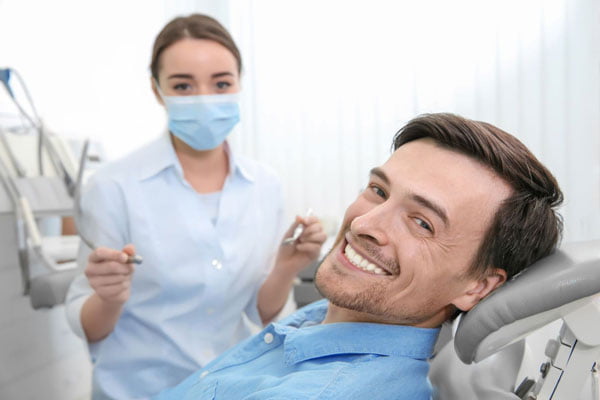Preventive dental care refers to oral healthcare that helps in the prevention of various dental diseases. It also helps keep the teeth and gums strong and clean.
Preventive dental care generally involves regular dental cleaning once every year, oral examinations, and X-rays of teeth for better observations by dentists, etc. The patient himself can practice preventive dental care at home simply by brushing teeth twice a day. Using a fluoridated toothpaste, floss, and an antibacterial mouthwash is recommended. The patient should brush their teeth very gently and should not apply too much pressure. Doing so helps remove any food particles stuck in the teeth and other confined spaces of the mouth.
Avoiding certain foods and beverages is also part of the practice. Acidic and oily foods like fries, carbonated cold drinks, etc. should be avoided as they can permanently damage the enamel. Hard foods like nuts, candies, raw and crunchy fruits, and vegetables should also be avoided. Quitting tobacco is another way of preventing dental diseases.
Using a mouth guard is also recommended if the patient is used to grinding teeth at night time. This protects the teeth from damage and hurt.
Practicing preventive dental care can have various benefits and can elevate the patient’s lifestyle. Also, preventive care can make the teeth appear much better and more beautiful therefore improving the patients’ self-esteem. It can also have a serious positive impact on the patients’ life. The best example of it is the early detection of deadly diseases. Diseases like oral cancer can be detected during preventive care.
Also, teeth become stronger due to the cleaning of bacterial and microbial accumulation. This accumulation is known as plaque and can be very damaging to the teeth. This cleaning also prevents the falling of teeth and tooth decay.
Let us understand why is it essential to practice preventive dental care.

Preventive Dental Care Early detection
Since preventive dentistry involves regular check-ups and X-rays of the teeth, many diseases can be detected.
If the patient is suffering from any underlying dental issues, then with the help of preventive dentistry such issues and possible diseases can be detected even if the symptoms are not obvious.
Sometimes life-threatening diseases are also detected through preventive dental care. If the patient is very fortunate, even diseases like oral cancer can be caught during preventive dental care sessions. If oral cancer is detected during its early stages, it can be treated and the patient’s life can be saved.
Prevention of tooth decay and loss
With the help of preventive dental care, the teeth can be strengthened and nourished from the inside and can be made to stay functional.
Dental cleaning in preventive dentistry also helps in cleaning bacteria and plaque accumulation, and tartar build-up. Plaque and tartar build-up eventually weakens the teeth and contributes to tooth loss. So removal of such build-up and accumulations prevents loss and dental decay.
Normal brushing may help to maintain bacterial build-up, but for plaque and tartar accumulation a dental cleaning is recommended by most dentists since both these are layers of bacterial accumulation and are very hard to remove.
Preventive Dental Care Saves money
Preventive dental care not only protects the dental health of the patient but also saves money. Since preventive dentistry can catch most diseases in the early stages, the patient is saved from the expensive treatments required to treat certain medical conditions.
So instead of paying big bills for the treatment, the patient can simply get regular check-ups which can be lifesavers as well as money-savers.
Better practices advised
When a patient regularly visits the dentist for general dental check-ups, the dentist can give them helpful advice on how to maintain dental healthcare in better ways. Along with dental examination, the dentist can suggest better practices like the correct way of brushing teeth, learning to floss gently, etc. to the patient.
Some helpful products like effective mouthwashes, specific toothpaste, and soft toothbrushes of specific brands can be recommended. Such products can prove very helpful to the patient since the products available in the market may not be suitable for every patient and may require customization.
Preventive Dental Care Improved appearance
Paying regular attention to teeth makes them appear brighter, smoother, and aligned. It adds greatly to one’s appearance and makes them feel good about themselves. If the patient does not practice preventive care, then it is highly possible that the patient may have discoloured and misaligned teeth. This can add negatively to the appearance and make the patient look unattractive.
So along with health benefits, preventive care is also very important for maintaining one’s appearance and keeping the smile vibrant.
Underlying diseases
Many non-dental diseases can be detected with the help of preventive dentistry. Diseases like heart strokes and coronary artery diseases are known to be linked with dental conditions like gingivitis. So when gun diseases and dental conditions arise there is always a chance of the disease progressing into these severe diseases. So during a normal check-up when diagnosing dental disease of any kind, the dentist can always refer the patient to a specialist if they notice any unusual symptoms.
Self – esteem
Since preventive dental care adds very positively to one’s appearance, the patients end up feeling very good about themselves. Whereas, patients who do not practice such prevention practices for their teeth generally report the deteriorating condition of teeth. The teeth often become discolored and start looking unattractive, automatically making the patient feel bad about themselves.
Also, reactive dentistry greatly improves the overall health of the patient. It leads to the patient feeling about not only their teeth but their whole physique.
Natural teeth preserved
When preventive care is performed regularly it automatically enhances the natural state of teeth. Since the teeth are also protected from falling off, they remain intact and healthy. The teeth become vibrant and beautiful; they add to the appearance along with the self-esteem of the patient. So, without receiving expensive procedures, the patient achieves a state of natural attractiveness.
